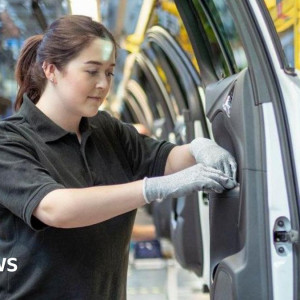UK to relax electric car sale rules as Donald Trump’s tariffs hit


US President Donald Trump has imposed a 25% levy on cars imported to the US, which is a major export market for the UK motor industry.
It came into force last week and is separate to a 10% tax on nearly all UK products announced by Trump on Wednesday.
A consultation on the government's EV target changes ended in mid-February, but Alexander told the BBC that the government had sped up the process of introducing them in response to the tariffs.
The government said it had worked with UK car manufacturers to simultaneously "strengthen its commitment to the phase out" while introducing "practical reforms to support industry meet this ambition".
Currently, 28% of new cars sold in the UK this year must be electric, a target that will rise each year until 2030.
But manufacturers will now be given more freedom in how they meet their yearly targets - meaning if they don't sell enough EVs in one year, they can make up for it by selling more the next year, for example.
In addition, the fine of GBP15,000 per vehicle sold that does not meet the latest emissions standards will be cut to GBP12,000.
Meanwhile, a ban on the sale of hybrid vehicles - which combines a petrol or diesel-powered engine with an electric motor - has been confirmed as from 2035.
Smaller British firms like Aston Martin and McLaren will be allowed to keep selling petrol cars beyond the 2030 deadline
As part of the changes, Prime Minister Sir Keir Starmer wrote in the Times on Monday that the government is "putting GBP2.3bn towards tax breaks for people buying electric vehicles and improving charging infrastructure".
The Treasury later told the BBC this means the government will invest GBP2.3bn in the car industry - all of which was announced in last October's Budget.